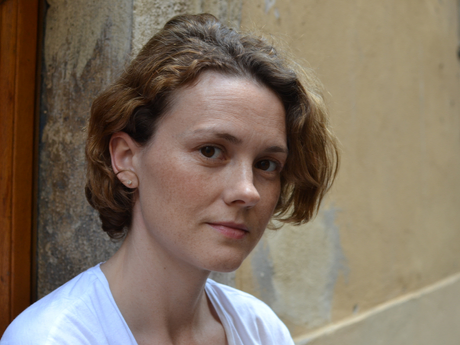In Their Own Words
Bridgette Bates' “What Is Not Missing Is Light”

What Is Not Missing Is Light (an excerpt)
Click: There I am as a child with my mother on the beach. A white border frames the memory of the mother and daughter. Click: The mother looks away from the child. A freighter floats by in the background. You only know it is moving when you look at the next photo and it's gone. Their red cheeks suggest delight, but that was before the worry of sunscreen. Click: The daughter climbs away from the mother's thin legs, drops her sandwich and tries to eat sand.
As an adult, I pull relics from my sweater:
A sand particle
A breadcrumb
A hair
All unyarned on the museum floor
Would you choose then or now to be alive? We are timeless on the beach so I am never fully here or there. My freckles clash with the whitewashed statue. Her ivory shoulder arc the same as the mother's, the same hips that have given birth, have curved a piece of life. Time, a tragedy of the body.
Click: The skin starts to fade before the eyes go.
On an excerpt from "What Is Not Missing Is Light"
In the past, we traveled to unknown cities, loaded our cameras with a roll of film, smiled and said "cheese," hoping a set of 24 photographs would expose a beautiful journey. Time and time again, I returned home from such trips eager to see what images I had captured, and upon developing my photos was surprised to find I had taken significantly more pictures of unknown pieces of art from inside a museum than of the usual landmarks and landscapes. Perhaps subconsciously I was attempting to preserve my own experience in a larger history of art and artifacts. Whatever the reason, these photographs mostly of ancient statues, often fragmented, untitled, and in need of repair haunted me well beyond my travels and inspired my book, What Is Not Missing Is Light.
In the "click" poem from this collection, I more directly address the idea of photographs as (un)reliable sources of memory. These handheld scraps of paper that document isolated moments in time. My parents keep a couple drawers worth of photos from my childhood, which I have examined over the years, piecing together a version of personal history. But they hardly capture full stories. There is so much more they don't record. They too are only surviving fragments of the past that I have come to idealize.
Recently, I've been thinking about what it means to hold on to the present. My son has been in this world for about 650 days, and we probably have 2,500 digital photos of him to date. Which JPEG will we save for all of eternity? I am fascinated by, but have yet to write about how our new ability to instantly choose, edit, and delete from a deluge of images—digitally not physically—may hasten the forming of memory, of perspective on the past, and how this may alter our struggle to survive and to mourn what does not survive. Perhaps subconsciously this poem is a prelude to that.


